Lovecraft: Why His Ideas Survive
H.P. Lovecraft is a polarizing figure. There are those who love his brand of horror and there are those who find it tiresome or overly inflated. Add to this that he was an eccentric and a racist and you have a figure that would seemingly not stand the test of time. Yet, it seems that everywhere you look you find an anthology of his works, art inspired by his writing or sections of magazines/fanzines/gothic websites titled after him. What makes this rather odd figure such a draw?
Positing two possibilities, this article looks at the open world that Lovecraft created as well as his lesser known but masterful long essay on the history of gothic literature. Lovecraft’s world was one of the first to be picked up by other authors and expanded. The cast of characters known as the Old Ones were and are a major factor of why much of his writing is still relevant. Secondly, few people pay much attention to the “academic” work that Lovecraft created. His Supernatural Horror in Literature was a massive undertaking that sought to review and categorize the gothic literature that was known up until the publishing of the long essay in 1927. Taken together these two factors can be noted as major reasons why Lovecraft’s work is still significant today.
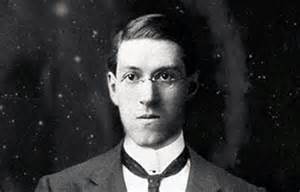
Open World
Lovecraft, more than any author of his age, created a fictional world that almost seamlessly mirrored the real one with the exception of supernatural occurrences. Replete with street names, cities (Arkham) and a very famous university (Miskatonic), Lovecraft made the reader feel as if he or she were really looking at small town America. No other author had created such a personal experience for the reader. The gothic writers of the seventeenth and eighteenth century were no strangers to borrowing from real life to create fictional landscapes. Walpole’s Otranto was based on and served as inspiration for his own home Strawberry Hill and Radcliffe had a keen eye for ruins when she penned the description of her castle in The Mysteries of Udolpho, yet these authors made the landscapes ephemeral, grandiose and romantic, not believable. When you read Lovecraft you have a sense of place, an area that you can grab on to and make sense of. Arkham is far more tangible than the wild and mist filled forests of Radcliffe’s gothic travellers.
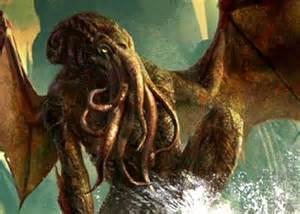
The reality of the landscape is superseded only by the intrigue attached to the Old Ones, a race of monstrous god-like creatures that have existed before humans and presumably before the earth was populated by anything at all. Stories like Dagon and The Call of Cthulhu specifically name some of these creatures and give us descriptions of what they are like. They have a primordial wetness attached to them where they are slimy or reminiscent of fish. Cthulhu is said to be a vaguely anthropoid monster “with an octopus-like head whose face was a mass of feelers” and a body that was wet and rubbery (Lovecraft 2008). Dagon too is named after the “Philistine legend…of the fish-god” and has scaly arms and lives under water (Lovecraft 2008). They are gods that are, unlike Lovecraft’s description of place, vague, undefined and largely obscure. Here the obscurity of the monsters in Lovecraft connect them intimately with the notion of terror. Obscurity, says Anne Radcliffe, “Leaves something for the imagination to exaggerate,” by confusing or blurring images an author is able to create chaos in the mind of the reader which not only leads to fear but also to feelings of the sublime (Radcliffe 1826). We will return to the notion of the sublime and terror a little bit later.
These gods then, have become something of a cultural trope. Their connection to terror and the early stages of the planet have inspired other authors to pick up on them and expand their numbers. August Derleth is probably the most well-known of Lovecraft’s successors but there have been many including the contemporary author Brian Lumley who has taken many Lovecraftian monsters and put them in different settings with characters of his own creation. Lovecraft’s monsters lend themselves to a particular type of monster-centered horror because they are so large and so primal. Any character dreamed up to fight against them or even interact with them becomes a symbol of modern man directly confronting the fear of the unknown. Humanity standing in the face of an unconquered past that exists with or without his/her input.
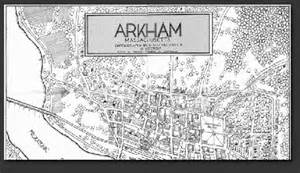
These monsters confront the reader with the notion that humanity is not as important as we may think we are. Philosophically, Lovecraft has reminded us that we are part of a planet, where a planet means a place that does not at all care whether we live or die. Eugene Thacker puts it this way: There is the World, the Earth and the Planet. The World is personalized, this is where “we” live and what we call home. Earth is everything that we may make personal, the birds and bees, flowers and mountains. Then there is the Planet. The Planet has existed before us and will exist after us, but that is the place where hurricanes tear down homes and earthquakes swallow towns. The Planet doesn’t exist for us or because of us, it just exists and is a brute fact of nature (Thacker 2011). Lovecraftian monsters exist like the Planet exists, a philosophical nexus that forces us to confront the very real idea that humanity has only been around for a short while and is not invincible.
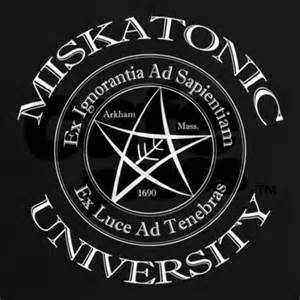
While such thoughts may be depressing or at the very least melancholic, they are real and they are part of Lovecraft’s appeal. Most of humanity does not confront these questions on a regular basis, but they are indeed part of horror/gothic literature. It is through horror literature that we are able to confront such questions in a safe way. Whether people in general face these questions directly or not is a topic for another article, but readers of horror literature are aware in a keen way of the danger that lurks behind every villain, and Lovecraft makes this a central idea in his work. To develop this side of Lovecraft further, we turn now to his long essay in which he studied the history of gothic literature but more importantly set down his own philosophical ideas.
Supernatural Horror in Literature
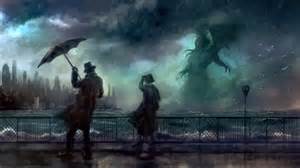
Many fans of Lovecraft, and for that matter, many of his detractors, have never read his long essay titled Supernatural Horror in Literature published in 1927. The work is a historical catalogue of the gothic literature that was known to Lovecraft in 1925. When asked to compile the work he took a full year to read authors he had not encountered as well as many that he had already read. He took seriously the preparation for such an undertaking. Largely the essay is a work that scans different time periods and different authors, either passing judgement on them as being good, bad, or indifferent and detailing whether or not they used supernatural or cosmic elements in their work. By way of adjudicating Lovecraft sets out his own thoughts on what makes horror literature good or at least “atmospheric,” a term that he uses to mean creating an emotion in the reader. For this article it is important to look at what Lovecraft thinks makes for good horror writing and what kind of elements he aimed at for his own work.
Lovecraft starts his essay with the famous lines,
“The oldest and strongest emotion of mankind is fear and the oldest and strongest kind of fear is fear of the unknown.” (Lovecraft 2012)
This is not a new idea, almost the same wording can be found in Edmund Burke’s treatise on the sublime,
“Whatever is fitted in any sort to excite the ideas of pain and danger, that is to say whatever is in any sort terrible, or is conversant about terrible objects or operates in a manner analogous to terror, is a source of the sublime; that is, it is productive of the strongest emotion which the mind is capable of feeling.” (Burke 1990)
What the two have in common is the idea that pain and fear are intimately connected with producing strong emotions in a reader/viewer. What Lovecraft wants to say is that there is a deeply embedded psychological fear of the unknown, and therefore when confronted with anything that cannot be immediately recognized or explained away the reader is left in a state of terror. Terror, it should be noted, is not the same as horror. Terror opens the soul and “awakens the faculties to a higher degree” (Radcliffe 1826), it looks for “where the audience lives at its most primal level” (King 2010), it is “cleaner and more profound” (Kaye 1985). In short, terror brings us into the sublime. Horror by contrast contracts and annihilates the soul (Radcliffe 1826), is gory and repugnant and what you see when you turn on the six o’clock news (Kaye 1985). So while Lovecraft does include the word horror in his title, it is clear that he really means terror in its literary-historical context.
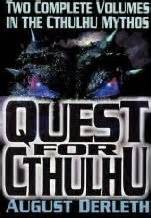
The major issue that Lovecraft takes with other gothic authors is that there work is often didactic, attempting to teach a moral (Lovecraft 2012). If any work attempts to teach then it is automatically optimistic according to Lovecraft, and optimism has no place in a work which is meant to excite our deeply embedded (virtually permanent) fear of the unknown. Further, he goes on to say that history has codified good feelings or optimism in religious ritual while it has codified feelings of fear and dread in supernatural folklore. This folklore has given rise to certain types of monsters that have been reused and changed throughout time but always combine fear, evil, wonder and curiosity in a composite body that provokes the imagination and creates keen emotion. For Lovecraft, cosmic fear literature has always existed and will always exist (Lovecraft 2012).
Finally, it has to be mentioned that Lovecraft did not care much for the everyday affairs of humanity. Though he was a prolific letter writer and corresponded regularly with friends, he consciously chose not to include the squabbles of mortals in his work. Lovecraft always aimed for literature that made humanity feel small and insignificant. His “creative imagination” was only sparked by the cosmos and the unknown. Relations between people was seen as being mundane and not particularly interesting. This belief is one of the reasons why Lovecraft thought other gothic literature to be optimistic. The heroine was most often saved from the villain and returned to a normal life. When a human deals with the cosmic they are forced to face primordial fear and the fact that they have confronted something that they cannot forget. Many of Lovecraft’s characters do end up insane or at the very least disturbed by their encounters. There is no return to Radcliffean or Walpolean normalcy at the end of cosmic horror.
Lasting Legacy
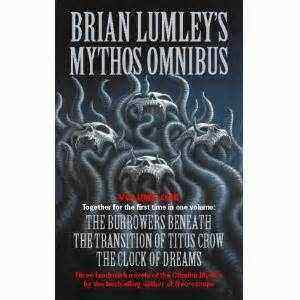
So what does all of this have to do with the lasting legacy of Lovecraft? As we have seen, Lovecraft has created a world that can be expanded almost infinitely. His creatures and places are imaginary, but their detail is very vivid. The notion of a pantheon of elder gods can stir the imagination and inspire other authors to expand that universe. In the hands of other creative individuals the few Old Ones that Lovecraft created can become a whole world or perhaps a whole universe inhabited by monolithic architecture, slimy creatures and gelatinous monsters.
Also, it has to be acknowledged that he is one of the first gothic/horror writers to expound a critical and full philosophy. Lovecraft wanted his readers to know that it was acceptable to think about gothic/horror in more than just the ways of eighteenth century romanticism. Connecting humanity’s deepest fear of the unknown to a type of literature intended to exploit that fear was mostly revolutionary in the 1920s. Up until this point there were plenty of authors who wrote about the sublime or fear felt when left alone in the dark, but few penned treatise on the psychological terror that can be excited when engaged with a story.
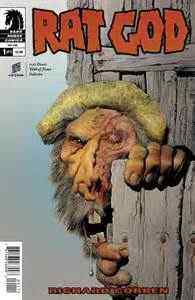
Lastly, it is fair to say that Lovecraft gave his audience diversity. Stories about a thrumming mass of rats, a haunted violin player and a Frankenstein-esque medical doctor all play to very real fears, but they are also very different. Lovecraft may not have had the severe poetic style of an Alexander Pope, and he wasn’t the first author to combine fear and medieval trappings, but he was a unique author that provided diversity, philosophy and horror all bundled up in short fiction. Lovecraft the man may be looked upon with some disgust because of his personal beliefs and attitudes, but the world Lovecraft made is expansive, rich, and interesting. From inspiring other authors to inspiring table top games, Cthulhu (and the rest of Lovecraft’s creations) loom large in the imagination of anybody who thinks about and enjoys gothic/horror literature.
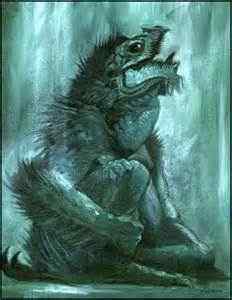
Works Cited
Burke, E. (1990). A Philosophical Enquiry into the Origin of our Ideas of the Sublime and Beautiful. Oxford University Press: Oxford.
Kaye, M. (Ed) (1985). Masterpieces of Terror and the Supernatural. Doubleday and Company: Garden City, New York.
King, S. (2010). Danse Macabre. Gallery Books: New York, New York.
Lovecraft, H.P. (2008). Necronomicon: The Best Weird Tales of H.P. Lovecraft Edited by Stephen Jones. Gollancz: London.
Lovecraft, H. P. (2012). The Annotated Supernatural Horror in Literature. Hippocampus Press: New York.
Radcliffe, A. (1826/2004). On the Supernatural in Poetry. In David Sander (Ed.). Fantastic Literature: a Critical Reader. Praeger Publishers: Westport, CT.
Thacker, E. (2011). In the Dust of This Planet. Zero Books: Washington.
What do you think? Leave a comment.











It’s clear you know quite a bit about Lovecraft, so keep adding to this material and give more details about the stories and the Gothic Horror essay! It is interesting that a writer not known for a significant prose style would still be so well known, and I think it’s because of those ideas you talk about. They give his stories a draw, a readability (I sat down and read “The Call of Cthulu” straight through). So what do the expansion works focus on? What else in his essay can we find in his creative work? Really interesting topic!
Hi Conorsmall,
Thank you for the read and the comment! There is actually a lot of stuff the expansions focus on so it would definitely be worth your time to take a look at Derleth or Lumley. I have enjoyed a bit of the Lumley stuff and as long as you get anything with Titus Crow (the main character in Lumley’s Lovecraftian mythos) you wont be disappointed. The one series that breaks the mold a bit is his dreamlands novels which focus on other characters but Lovecraftian monsters. PM me if you ever want to chat Lovecraft!
Thanks again
He’s popular because he actually had… an imagination
I personally like his obsession with mankind’s shocking inability to know the truth. He repeats over and over: the unnameable, the unknoweable, the unspeakable. I find this a comforting, albeit guilty, pleasure…
What really kickstarted Lovecraft’s rise was Sandy Peterson’s role playing game ‘Call of Cthulhu’. That was the real point where the Lovecraft revival took off.
It was an excellent game too
Agree 100%. It was for my friends and I, our first introduction to HP Lovecraft.
Despite his sometimes poor writing and pretty obviously abhorrent views on race – the stories still work, they drip with a sense of horror. Somehow, despite some pretty hammy descriptions, that sense of horror still comes out.
At it’s heart – his writing often emphasises that understanding the true nature of the horror that surrounds us leads only to madness. it’s a double whammy – not only are you afreaid of the unspeakable horror, but also of where it leads you.
For me it’s the utter bleakness of his stories. There is no hope, no god, no science, no nothing can save us. People are dumb, bumbling happy meals, with legs. Something is so chilling about his stories, so different from Steven King happy endings (or hero, with a bit of belief in god, self sacrifices, so saving the day type stuff). Darker, bleaker than any hammy Gothic yarn. In Lovecraft there is no real escape, only madness or death.
I’m not sure anyone has been so bleak, yet created such a fully realised mythos. Badly written and racist much of it is, but in pure creativity and imagination, it is exceptional.
You’ve not read King’s The Mist then? A fine love letter to Lovecraft, and a far from cheerful ending.
Good point well made!
Yes you’re right the Mist is bleak, though I got the message of “don’t give up, never surrender”. The tragedy is they take the easy, not sanctioned by god, way out. If they’d had faith (okay not nutty slack faith like the people in the shop), but if they’d hung in their, they’d have lived. Bleak, but another not so subtle believe in Jesus message from King.
But I do agree this is great horror story, and one of the best film versions, and Very Lovecraft-ian.
Lovecraft was often a very good writer indeed.
He was a great writer in short spurts.
I personally find HP quite cheerful. However depressed I am about the real world I’m unlikely to be devoured by gibbering squamous horrors from beyond space and time so the contrast is refreshing.
Even the racism is so overblown I find it hard to be as offended as I should be. Actually I suspect most of the genuine fear of the alien and strange in Lovecraft is just sublimation of his xenophobia. I have been to towns that felt like Innsmouth though.
I grew up in East Anglia, there are ALOT of Innsmouth like towns and villages there…
He had an amazing imagination. Compared to the Christian Bible his stories are eminently more believable.
Follow the bouncing ball and sing along:
Ph’nglui mglw’nafh Cthulhu R’lyeh wgah’nagl fhtagn
I think you may be on to something…perhaps you can get a band together and write the tune!
I remember reading his works in my teens. I had to sleep with my light on for a loooong time, even calling my mother at night because I was terrified. I just couldn’t stop reading even though I knew it would affect me later. great writer.
For a uniquely Japanese spin on the mythos, have a look for Haiyore! Nyaruko-san. The Lovecraft references in there range from the obvious to the subtle.
I had no idea that there were such cross cultural influences! thanks for bringing this to my attention, I will definitely take a look
A big reason for his popularity is his central role in the creation of SF fandom in the 20s and 30s. He corresponded prodigiously with young fans and encouraged many who later became writers and editors themselves.
You are very right, he was an amazing letter writer and that is one of the things that few people are aware of. In some ways we have a lot to thank him for…although an article about Lovecraft and Comicon may be interesting!
Loved his work.
H. P. Lovecraft has always had a steady, small following from the time of his writing, particularly with other creative people.
I like his stories and novels because you know the protagonist is toast right from the start.
I honestly think he’s quite a poor writer – and I’m a great fan of Henry James so it’s not the tortured nature I disapprove of – but I also think that his overly baroque style is key to his appeal. If you’re going to spend some time in his head, the creaky prose makes it more comfortable, like a well-worn armchair.
His stories can read like therapy sometimes. His characters often struggle with speech at some point, and I wonder if this reflects his own difficulties in getting across what he really felt.
I love HPL Why well the oddness of it all, the strangeness of it all, the alienness of it all. At the Mountains of Madness, The Call of Cthulhu, The Shadow over Innsmouth’ I will read time and time again. The descriptions of the various races and worlds to me are amazing – not a strange knobbly forehead in sight! believably strange places and creatures when I read any of his stories I can almost feel the fear and smell the rot and damp hear the shuffling which for me is quite an unusual thing.
His worldview seems to me merely an unblinking, scientifically strong-minded stare at our miniscule place in the universe.
Many of his stories are pretty bad – A Shadow Out of Time among them, as it happens – but there’s a core of extraordinary tales that almost vibrate with conflicting emotions of self-hatred and cruel arrogance: The Outsider, The Call of Cthulhu, The Whisperer in Darkness, The COlour Out of Space, The Dunwich Horror, The Case of Charles Dexter Ward and – most of all – The Shadow Over Innsmouth, a handful of others.
I hate people who bang on about HPL being an awful writer or having a terrible style: it’s the worst sort of received opinion, tin-eared at best ignorant at worst. When he was on – which isn’t often, it’s true – his writing is precise, brilliant and atmospheric. This small canon of extraordinary stories is the other reason he’s so well remembered: he was, occasionally, a genius.
Well I picked up a trashy paperback copy of The Strange Case of Charles Dexter Ward in about 1965/66 at our scout troop jumble sale aged 13/14, attracted by the schlock horror cover.
Having read a few of my mother’s Dennis Wheatley horror, ideal grounding for a good Catholic boy, I thought I had the horror genre cracked.
Was I in for a shock.
It terrified the life out of me and I couldn’t sleep with the light off for weeks.
Where Wheatley’s satanist horror was well grounded in Catholicism, Lovecraft’s gothic style came out of the howling, frozen wastes of madness.
I was hooked.
Though in small town Essex back then it was incredibly hard to find any of his books and I have to say that introducing me to Lovecraft was the best thing.
Lovecraft still has the ability to send a shudder through me.
That is why he is so popular a really matters today.
his imagery is enduringly evocative…certainly seems to denote presence of some talent.
The longest I’ve ever taken to read a book was the monolithic At The Mountains of Madness which is only 100 pages but the prose is just so dry that it’s a chore and, even worse, his way of conveying fear by having the characters basically say ‘the scene is so horrific that I can’t describe it’ feels incredibly cheap. To me, he’s basically literature’s Marilyn Manson: has this aura of being spooky and edgy but the actual content is really bad.
A lot of the fun (!) of reading Lovecraft is letting your own imagination take over where his protagonists do not or, even better, cannot describe the situations for themselves. This probably means that attempts to film the original stories are doomed because personal interpretations are likely to be wildly different. Saying which, I’d love to see the proposed Guillermo del Toro take on In The Mountains of Madness.
He was erudite he went to the trouble of creating an elaborate mythos as a backdrop to some of his stories. His main deity is blind and in maddening pain… As an adolescent that appeals.
That is a really interesting way of looking at it. I think that may be able to be turned into a topic all on its own!
I’d like to recommend Lovecraft’s superb long essay, ‘Supernatural Horror in Fiction”. This is a great overview of horror fiction from Dante to James (both of them). Lovecraft has excellent taste and he’s so enthusiastic about the subject that you want to go away and read the stories he champions.
What Lovecraft tapped into was modernism, and not the soft derived modernism of the avant-garde artists, but the original modernism of the physicists and the mathematicians: set theory, non-Euclidian geometry, relativity, quantum mechanics. He plays on anxiety, rather than fear, depicting a cosmos that is not only counter-intuitive but, in fact, inexplicable. The horror is in our awareness of unknowable malignancies that are so far beyond our comprehension that we cannot describe them. “That is not dead, which can eternal lie, and with strange aeons, even death may die.”
The Haunter of the Dark gave me nightmares that recurred for years and The Shadow Out Of Time made me too scared to turn the page. I was, admittedly, about 12 but nothing’s ever had that effect on me since.
If it was not for Arkam house publishing he would most likely be forgotten about is the black emptiness of the abyss.
The greatest bad writer of all time.
Lovecraft is, like some authors (including, I would contend, Tolkein) proof that your prose does not have to be brilliant in order to launch or reinvent a genre. I don’t particularly appreciate his work, but I do appreciate the world he built, and all the works he inspired and influenced, from Call of Cthulu (the game) to Hellboy and beyond.
Great article! The persistence of Lovecraft is one subject that seems to puzzle many writers, which means it is always fun to read about it.
Thank you for the read and comment. I would add that it is also what makes him fun to write about!
I finally got round to reading some of his work recently. I was somewhat surprised to find that the three stories I plucked at random all featured a valley with a river running through it from which an unspeakable horror that smelled of fish would arise.
Some of the greatest pieces of art ever created have been created out of sorrow.
Great stuff, highly imaginative author.
It’s fashionable to quote some of his more egregiously affected passages to demonstrate his awfulness; and indeed some of those passages are not good at all — especially taken out of context. But if you read much of his writing, you can find both elegance and strength.
If you haven’t read any Lovecraft, perhaps because you don’t really like the idea of horror per se as a genre, consider “The Dream-Quest for Unknown Kadath” as a representative work. It’s what we might call “dark fantasy” now, and includes both striking imagery and fantastic imagination along with a few of those overly ornate passages for which he is rightly criticized.
Interesting article. It shows me how the literary genre of horror has evolved since it was created.
Thank you. It is definitely a genre that has had many faces over the years.
If you haven’t read it yet, you’d probably find Nathaniel Wallace’s dissertation, “H.P. Lovecraft’s Literary “Supernatural Horror” in Visual Culture”, super interesting. He writes about the literary impact that Lovecraft has had on contemporary art, including visual media. I haven’t finished it yet, but it’s pretty interesting. It’s accessible here through Ohio link’s digital library: https://etd.ohiolink.edu/ap/10?0::NO:10:P10_ACCESSION_NUM:ohiou1417615151
Thank you, that is awesome! I will definitely check it out.
Lovecraft’s compositions are saturated with horror. I think it’s good to read when you have an appropriate mood.
Awesome ideas. Have you or anyone read “Lovecraft’s Monsters?” That collection shows how Lovecraft continues to inspire artists and readers. One aspect, I’d be curious about how you feel about the diction. I hear a lot of people struggling with the diction. Would you ever want to see any kind of modern English versions of his stories?
Gothic and Weird lit are my favorite horror subgenres, so this was an engaging read. Despite some disturbing racial and anti-Semitic point of views (that should absolutely be called out), Lovecraft was a pretty enthralling writer with a profound impact.
Excellent review. In my humble opinion, what stands out about Lovecraft’s works is that he focuses his efforts on describing the narrator’s (and thus often the reader’s) physiological and emotional experience, while often neglecting descriptors of the “monster”. I believe this is a significant variable that maximizes the medium of literature and makes his work virtually untranslatable to other mediums, particularly movies which most have been pale approximations of his stories.
Lovecraftian horror plays on a very basic human fear, I think. It’s the fear that there are things so great and powerful, they cannot be understood or comprehended (hence, why characters tend to go insane in his work). It’s a fear of the sublime, in Burke’s sense of the term. What’s interesting is not only how Lovecraft himself survives, but his tropes and his world survive in an intertextual relationship with other cultural artifacts. Look at Bloodborne or True Detective – it’s all contingent upon Lovecraftian tropes and horror.
A pretty cool read about my all time favourite author of horror. Shows that we should value him for more than the C’thulian mythos.
Very interesting
Just so happens that I came upon this article while I’m in the middle of Camille Paglia’s book Sexual Personae. In it, she attempts to catalogue the ways in which pagan ways of seeing and archetypes of polytheistic gods, rather than being stamped out by Judeo-Christianity, have lived on beneath the surface of Western high and popular art, including in Hollywood films. One of the words she keeps coming back to is “chthonian,” meaning “of or relating to the deities, spirits, and other beings dwelling under the earth.” I understand the word comes up in the Cthulu mythos, and is evidently echoed in the name of that creature.
A great read to introduce Lovecraft’s immense influence over the supernatural horror genre. One could mention that he pioneered the weird literature form following previous themes that began turning stale or did not relate to the weird. Previously, writers obsessed over stories featuring deals with the devil (Melmoth by Charles Maturin), ghost, ghoul and vampire stories (Undine by Friedrich Heinrich Karl). These stories inherit human qualities and shortcomings such as heroism, morality, evil, greed, lust and tradition. However, Lovecraft’s monsters, protagonists, settings and plots feel otherworldly as he purposely keeps emotion away from his work, turning it cold, yet relatable.